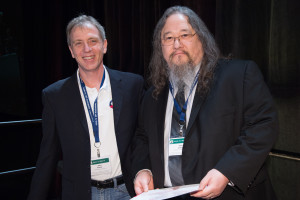
CCC Chair Greg Hager presenting David Ackley with his Blue Sky Ideas Award at AAAI 2016.
The following Great Innovative Idea is from David H. Ackley from the University of New Mexico. His Indefinite Scalability for Living Computation paper was one of the winners at the Computing Community Consortium (CCC) sponsored Blue Sky Ideas Track Competition at the 30th Association for the Advancement of Artificial Intelligence (AAAI) Conference on Artificial Intelligence (AAAI-16), February 12-17, 2016 in Phoenix, Arizona.
The Innovative Idea
Traditional digital computers employ hardware determinism, meaning that running a program twice on the same inputs is guaranteed to produce the same outputs. Determinism greatly simplifies programming the machine, but ultimately limits its size—and encourages the development of software that is highly efficient, but also extremely fragile, and all but impossible to keep secure.
The blue sky idea is this: We should abandon hardware determinism in favor of best-effort computing in both hardware and software. Best-effort hardware tries its best to get everything right, but offers no guarantees, while best-effort software gets access to vast computing power, but has to help out with reliability and keeping things straight—perhaps by checking its own work if it’s got a moment, for example—which traditional efficiency-only software
never does.
Impact
It will take a lot of science and engineering to flesh out, but best-effort computing systems can be not only vastly larger than deterministic systems but also fundamentally robust when facing error and the unexpected, tending to do something sensible even if stressed beyond their normal limits. Such down-to-the-bone robustness is virtually nonexistent in computing today, and that is an increasingly risky proposition as we continue to give our machines ever more real-world responsibilities.
Other Research
I’m currently all about best-effort computing research, development, and advocacy, but that one area presents opportunities and challenges
across computer science. With collaborators, we are working on a specific best-effort computer architecture called the Movable Feast Machine; we are developing the ULAM programming language for that architecture, and developing libraries of reusable best-effort software components. We are also pursuing theoretical notions of quantified correctness in a formal framework, for example to explore average- and worst-case scalable robustness.
Researcher’s Background
I completed degrees in applied mathematics at Tufts and computer science at Carnegie Mellon. My research background is in machine
learning, computer security, and artificial life—and, perhaps predictably, best-effort computing draws from all those fields. Best-effort software, for example, naturally employs ‘living systems’ strategies like reproduction, growth, and healing—not as a model of any particular natural creature or living system, but as engineering tools to get the job done robustly.
Links
There are papers and more information at http://www.cs.unm.edu/~ackley. There are talk and demonstration videos athttp://www.youtube.com/user/DaveAckley/videos, open-source code repositories at https://github.com/DaveAckley, and precompiled
Ubuntu packages for ULAM and the Movable Feast available via https://launchpad.net/~ackley/+archive/ubuntu/mfm.
To view more Great Innovative Ideas, please click here.









